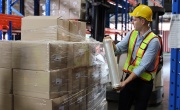Scotland's Recycling Improvement Fund delivers 4,668 tonnes additional recycling in 2023
Zero Waste Scotland appraisal finds Scotland's £70 million Recycling Improvement Fund delivered 4,668 tonnes additional recycling in 2023, with projects achieving 61 per cent of annual targets whilst creating 30 new jobs across participating local authorities.
 Scotland's £70 million Recycling Improvement Fund achieved significant early success in 2023, generating 4,668 additional tonnes of recycled material across ten local authority projects, according to a new evaluation from Zero Waste Scotland.
Scotland's £70 million Recycling Improvement Fund achieved significant early success in 2023, generating 4,668 additional tonnes of recycled material across ten local authority projects, according to a new evaluation from Zero Waste Scotland.
The longitudinal evaluation, published in June 2025, assessed projects representing £15.6 million of total funding awarded. Results showed the initiatives achieved 61 per cent of their annual recycling targets in their first operational year, alongside 100 tonnes of materials diverted for reuse.
The fund launched in March 2021 is one of Scotland's largest recycling infrastructure investments, supporting progress towards the country's target to recycle 70 per cent of all waste by 2025. According to the most recent figures, the country recycled 62.3 per cent of waste across all sectors in 2022.
Local authority successes demonstrate fund impact
West Lothian Council achieved the most substantial results, adding 3,848 tonnes of recycling through a new twin-stream service that significantly reduced contamination rates in both target waste streams.
Fife Council introduced Scotland's first local authority plastic film collection service, recovering 456 tonnes in its first year. The initiative utilised new optical sorting equipment purchased with RIF funding to enable separation of soft plastics previously sent to residual waste.
East Lothian Council's new weekly kerbside collection service generated 195 tonnes of additional recycling across multiple material streams. The service introduced 17 resource recovery vehicles and collection containers, creating 18 new jobs in the process.
Environmental benefits exceed expectations
The recycling improvements delivered carbon savings estimated to be 4,580 tonnes CO2eq in 2023, which the report says is the equivalent to the environmental impact of planting over 400,000 trees a year. This exceeded the fund's projected carbon reduction targets for participating councils.
Seven of eleven interviewed local authorities reported their projects had successfully achieved stated goals, with all participants noting positive outcomes extending beyond recycling metrics. The fund enabled creation of approximately 30 new jobs whilst supporting collaboration with community organizations and third sector partners.
Projects addressing problematic materials showed particular success. Comhairle nan Eilean Siar achieved a 23 per cent increase in targeted material recycling over seven months through redesigned collection services. North Ayrshire Council's household waste recycling centre improvements enabled reuse of 22 tonnes of mattresses alongside enhanced recycling facilities.
Charter alignment drives consistency improvements
The evaluation found seven projects reported that RIF funding enabled better alignment with Scotland's Household Recycling Code of Practice. Initiatives focused on twin-stream collections, expanded material types, and improved infrastructure consistency across council areas.
Perth & Kinross Council's city centre recycling service demonstrated how targeted interventions can deliver significant local improvements. The service achieved an 11 per cent increase in dry mixed recycling and 13 per cent increase in food waste collection within its first year of operation.
Future monitoring planned as fund expands
Zero Waste Scotland confirmed the longitudinal evaluation will continue annually as increasing volumes of data become available. To date, more than £66 million has been awarded to 48 projects, from 27 local authorities across Scotland.
The fund supports initiatives ranging from kerbside collection improvements and household waste recycling centre upgrades to innovative material processing technologies. Results suggest continued expansion could significantly contribute to Scotland's 2025 recycling targets, though achievement remains challenging given current progress rates.



